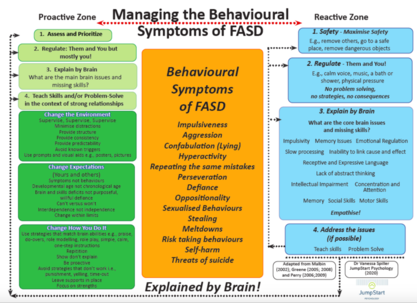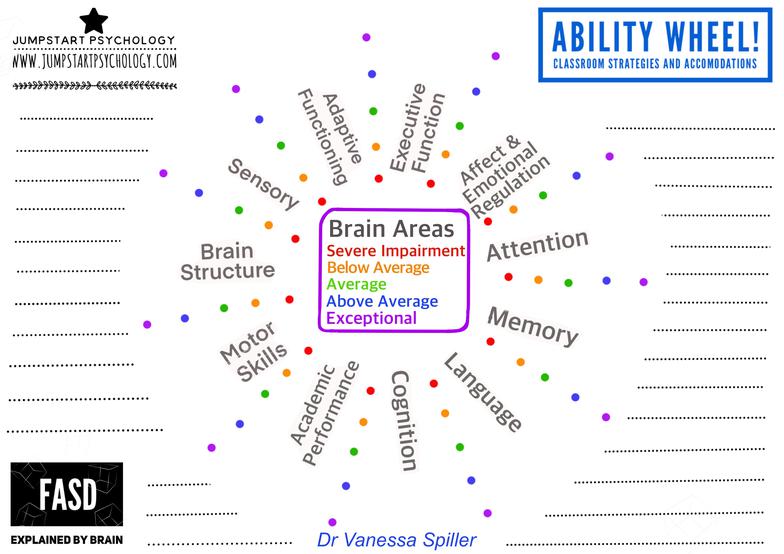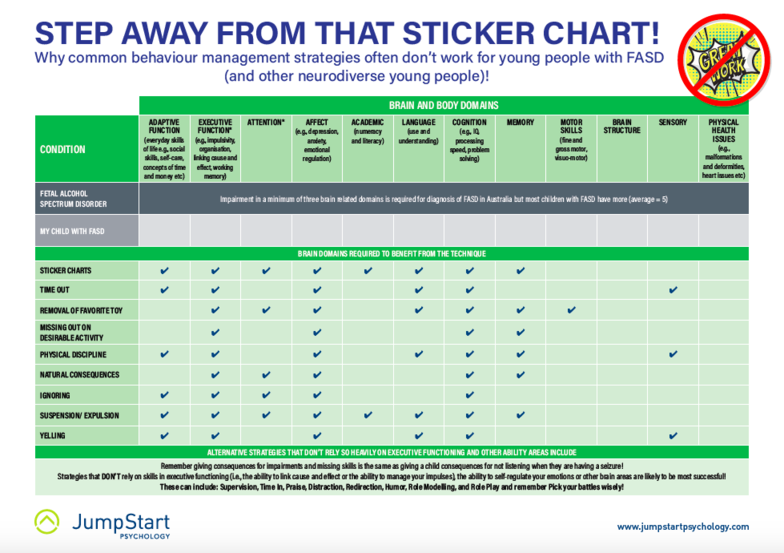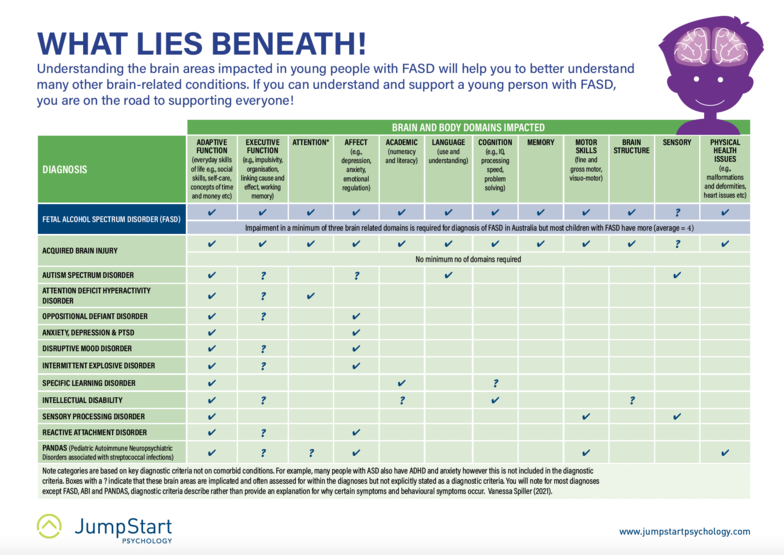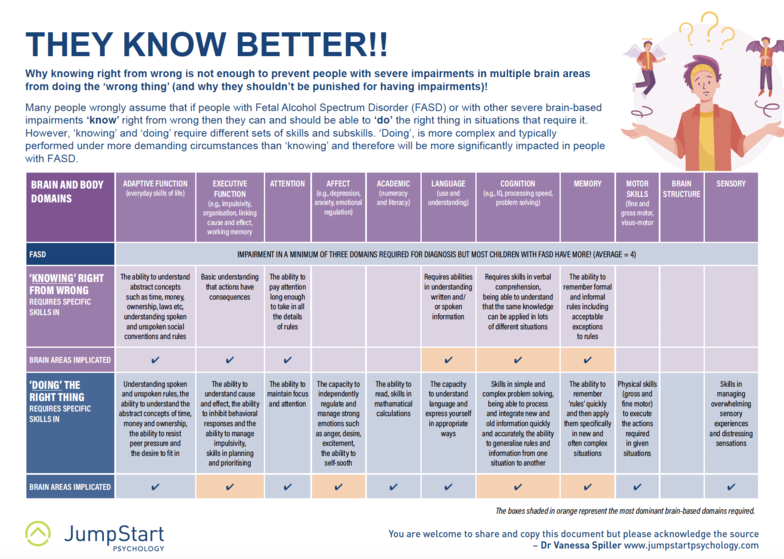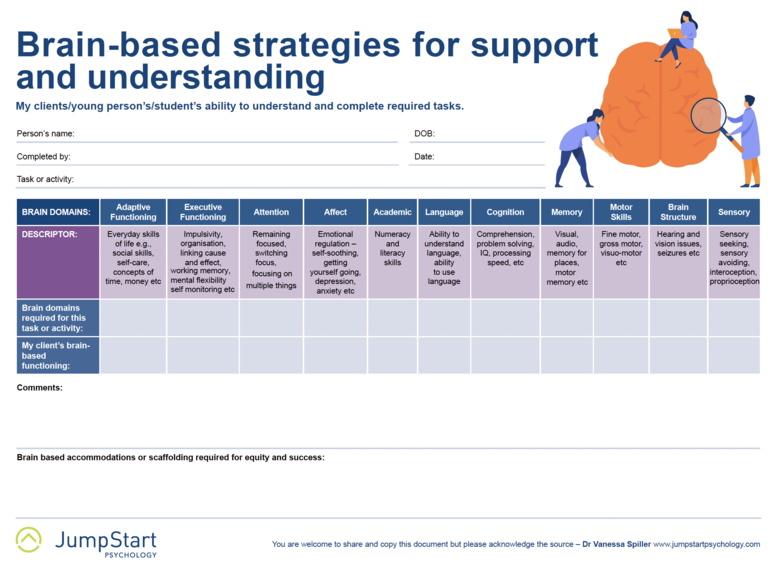FASD Diagnosis and stigma
A brief youtube video highlighting the value of diagnosis despite concerns about stigmatising parents and young people with FASD
https://www.youtube.com/watch?v=tadyf5w5VS8&t=2s
Why do people with FASD all seem so different!
A brief youtube video discussing why prenatal alcohol exposure impacts differently on individuals with FASD
https://www.youtube.com/watch?v=cstSROpEUWg&t=9s
FASD Hub - Vanessa's Story
A brief youtube video from FASD Hub explaining my "why"!
https://www.youtube.com/watch?v=x9iqHSmzRZA&t=2s
Insight QLD
This is an 1hr professional development done in Brisbane (15/5/19) for Alcohol and other Drugs workers on working with individuals with FASD and their families.
https://www.youtube.com/watch?v=zRkC6ZQebMg&feature=youtu.be
FASD Ability Wheel! (PDF and Video)
The FASD Ability Wheel is a one page resource designed to help parents and carers quickly and accurately communicate their child's functioning in 11 brain domains! It is ideal to give to teachers, teachers aides and other support workers so they can better understand your child and their abilities - their strengths and weaknesses. It also includes spaces for you to include the key strategies and accomodations that will assist your child!
The video accompanying video explains how to complete the FASD Ability Wheel and where you can get more information about about supporting your young person with FASD!
Follow the link to download your free PDF copy of the FASD ability wheel!
Managing Behavioural Symptoms of FASD - The Explained by Brain Approach!
This is a summary of brain-based approaches to managing the behavioural symptoms of FASD. A resource suitable for parents, carers, teachers and other professionals. It provides a responsive and flexible framework and offers both reactive and proactive strategies to understand and better help people with FASD achieve success!
Follow the link to download your free PDF copy
Step Away from that Sticker Chart!
This educational resources provides brain-based reminders about why young people with FASD often don't respond to common behaviour management techniques. Suitable for sharing with teachers.
Follow the link to download your free PDF copy
The FASD Success Show with Jeff Noble - #024 Dr Vanessa Spiller: Little Things Make a Big Difference with FASD
Listen to a podcast hosted by Natalie Vecchione where we discuss the Explained By Brain approach to supporting young people and their families impacted by FASD.
Downloadable Worksheets,
Short Videos & More
FASD Hope with Natalie Vecchione - #62 Explained by Brain - A Conversation with Dr. Vanessa Spiller
Listen to a podcast hosted by leading FASD Educator - Jeff Noble talking with Dr Spiller about parenting approaches suitable for young people with FASD from a professional and personal perspective.
What Lies Beneath!
This chart explores the overlap in brain domains impacted by some of the most common diagnoses including ADHD, Autism, Anxiety etc. Suitable for sharing with teachers. By understanding the underlying brain domains impacted in young people, we can better understand their strengths and challenges and find the supports and interventions that work for them.
Follow the link to download your free PDF copy
They Know Better!!
Ever wondered why many people with FASD can tell you what they should do but can't seem to do it when it's needed? Tired of people telling you that if someone knows what to do then don't do it is because they are choosing not to? This two page resource highlights that "knowing" and "doing" are two different skills sets and you can have one but struggle with the other! Useful for parents, carers, teachers and justice workers! Adult and child version available to download below!
Follow the link to download your free PDF copy
Don't forget to check out Explained By Brain: The FASD Workbook and videos for all the background information on FASD and 100's of strategies and accomodations that may assist a young person with FASD!
Listen to a podcast hosted by Natalie Vecchione where we discuss the Explained By Brain Parent Carer Training
FASD Hope with Natalie Vecchione - #62 Explained by Brain - A Conversation with Dr. Vanessa Spiller
Brain-based Strategies for Support!
(Getting off the X-box & Completing forms)
Why are everyday tasks like getting off the X-box or filling in forms for Centalink are so challenging for people with FASD? The things we consider simple, often involve multiple different brain domains! If you have impairments in any of these domains or in multiple of these domains, it becomes clear why these tasks are not at all simple or straight forward. This fillable worksheet helps you break down any task or activity to the brain domains required and match these to your young persons skills and abilities, making the need for accommodations and adjustments obvious and highlighting where these are needed most! A great resource to share with teachers and support workers!
Follow the link to download your free PDF copy
Adult version
Child version
FASD and Diversity
A full length video from FASD Hub on FASD and diversity
If you appreciate the resources that I create please consider paying a self-determined price to download them. You are absolutely welcome to download them for free but if you are able to support my work, even in a small way, it would be greatly appreciated and allows me to keep creating more resources!
Thanks, Vanessa
I want everyone to be able to access most of the resources I create that's why they are available free of charge. However, they take time, money and expertise to create. If you are in a position to make a financial contribution, this would be greatly appreciated and will allow me to continue to do what I enjoy doing - creating resources that educate and make people's lives easier! To make a contribution simply add an amount in the cart. If you are not in a position to contribute, no problem and no pressure, please download for free, no questions asked! Thanks - Vanessa
Suggested contribution: $2
Suggested contribution: $2
Suggested contribution: $2
Suggested contribution: $2
Suggested contribution: $2
Suggested contribution: $2


